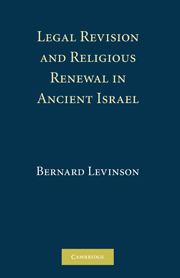Book contents
- Frontmatter
- Contents
- List of Figures
- Foreword, by Jean Louis Ska
- Preface
- Abbreviations
- 1 Biblical Studies as the Meeting Point of the Humanities
- 2 Rethinking the Relation between “Canon” and “Exegesis”
- 3 The Problem of Innovation within the Formative Canon
- 4 The Reworking of the Principle of Transgenerational Punishment: Four Case Studies
- 5 The Canon as Sponsor of Innovation
- 6 The Phenomenon of Rewriting within the Hebrew Bible: A Bibliographic Essay on Inner-Biblical Exegesis in the History of Scholarship
- Author Index
- Subject Index
- Index of Scriptural and Other Sources
4 - The Reworking of the Principle of Transgenerational Punishment: Four Case Studies
Published online by Cambridge University Press: 18 August 2009
- Frontmatter
- Contents
- List of Figures
- Foreword, by Jean Louis Ska
- Preface
- Abbreviations
- 1 Biblical Studies as the Meeting Point of the Humanities
- 2 Rethinking the Relation between “Canon” and “Exegesis”
- 3 The Problem of Innovation within the Formative Canon
- 4 The Reworking of the Principle of Transgenerational Punishment: Four Case Studies
- 5 The Canon as Sponsor of Innovation
- 6 The Phenomenon of Rewriting within the Hebrew Bible: A Bibliographic Essay on Inner-Biblical Exegesis in the History of Scholarship
- Author Index
- Subject Index
- Index of Scriptural and Other Sources
Summary
CRITICAL SCRUTINY OF THE PRINCIPLE IN LAMENTATIONS
The idea of using the formula for transgenerational punishment to account for the Babylonian exile may well have become commonplace right from the beginning of the exilic period. Fugitives who fled Jerusalem seem to have inscribed key elements of the formula on the walls of caves in which they took shelter. It is also reflected in a series of exilic and postexilic biblical texts. These texts confirm, however, that this historiographical “solution” created as many theological difficulties as it sought to solve. Lamentations, for example, preserves a moving poetic dirge over the destruction of Jerusalem and the suffering of its population. Near the book's close, the speaker seems to share the orientation of the historiographer of Kings as he, too, accounts for the destruction as divine punishment for the apostasy of previous generations. That rationalization is now, however, subjected to critical scrutiny.
Our fathers (וניתבא) sinned and are no more;
But as for us—the punishment for their iniquities (םהיתנוע)–we must bear!
(Lam 5:7)The terminology of the lament, which pointedly refers both to “fathers” (תובא) and to “punishment for iniquities” (תונוע), alludes to the Decalogue's doctrine of the transgenerational consequences of sin, in which God describes himself as “visiting the punishment for the iniquity of the fathers upon the sons,” םינב לע תבא ןוע דקפ (Exod 20:5).
- Type
- Chapter
- Information
- Legal Revision and Religious Renewal in Ancient Israel , pp. 57 - 88Publisher: Cambridge University PressPrint publication year: 2008



